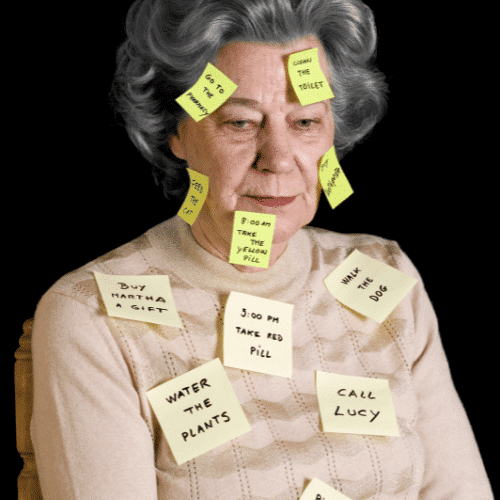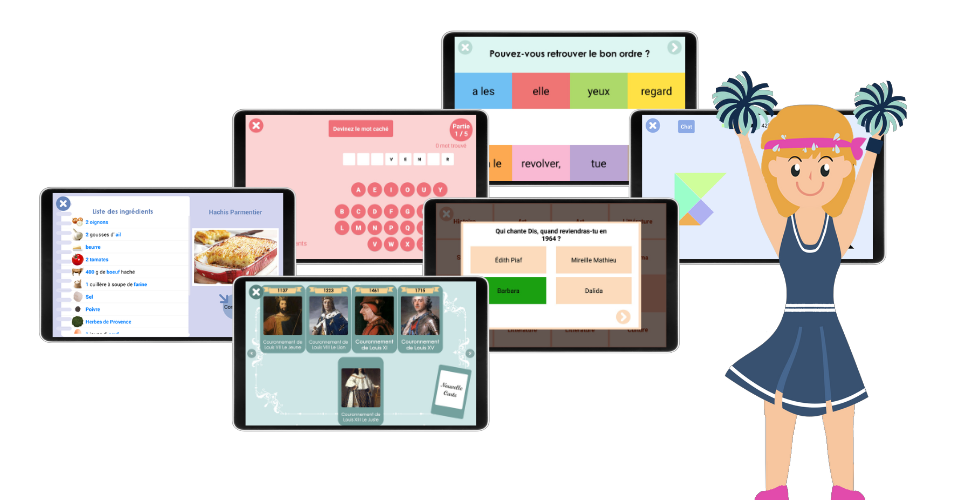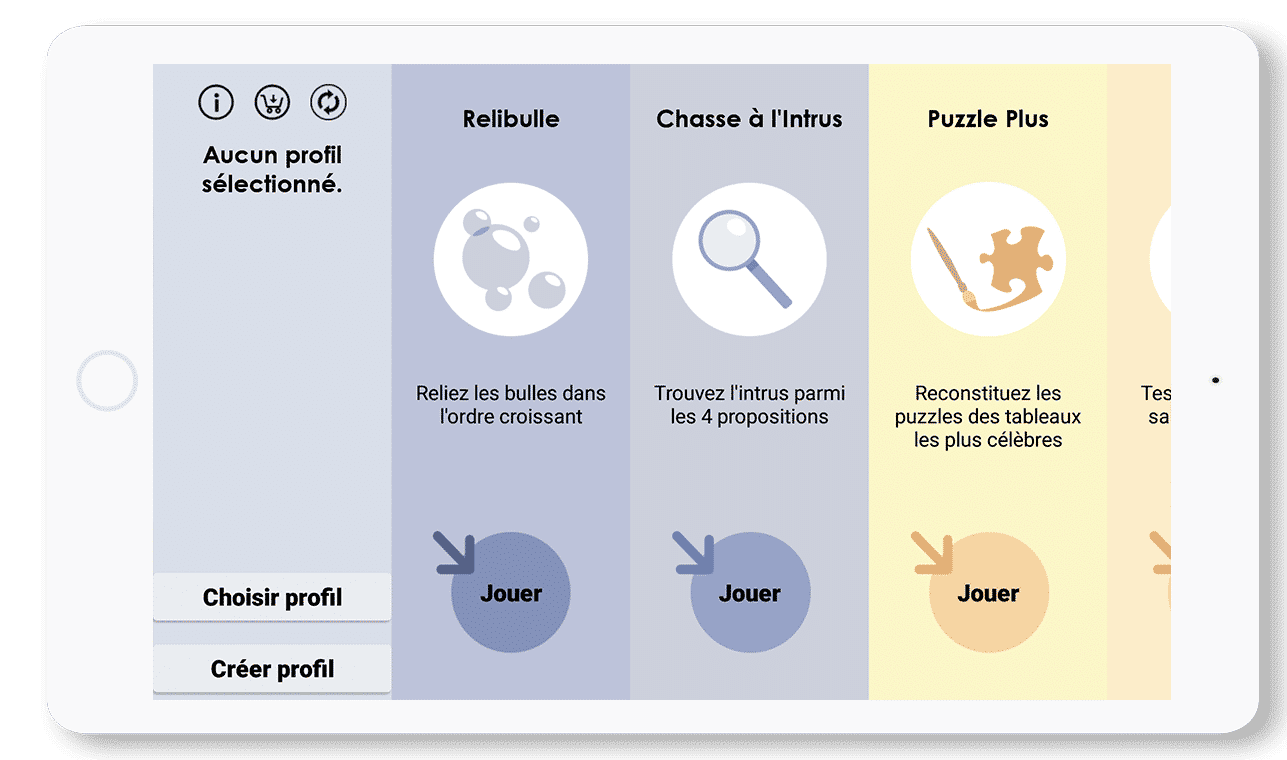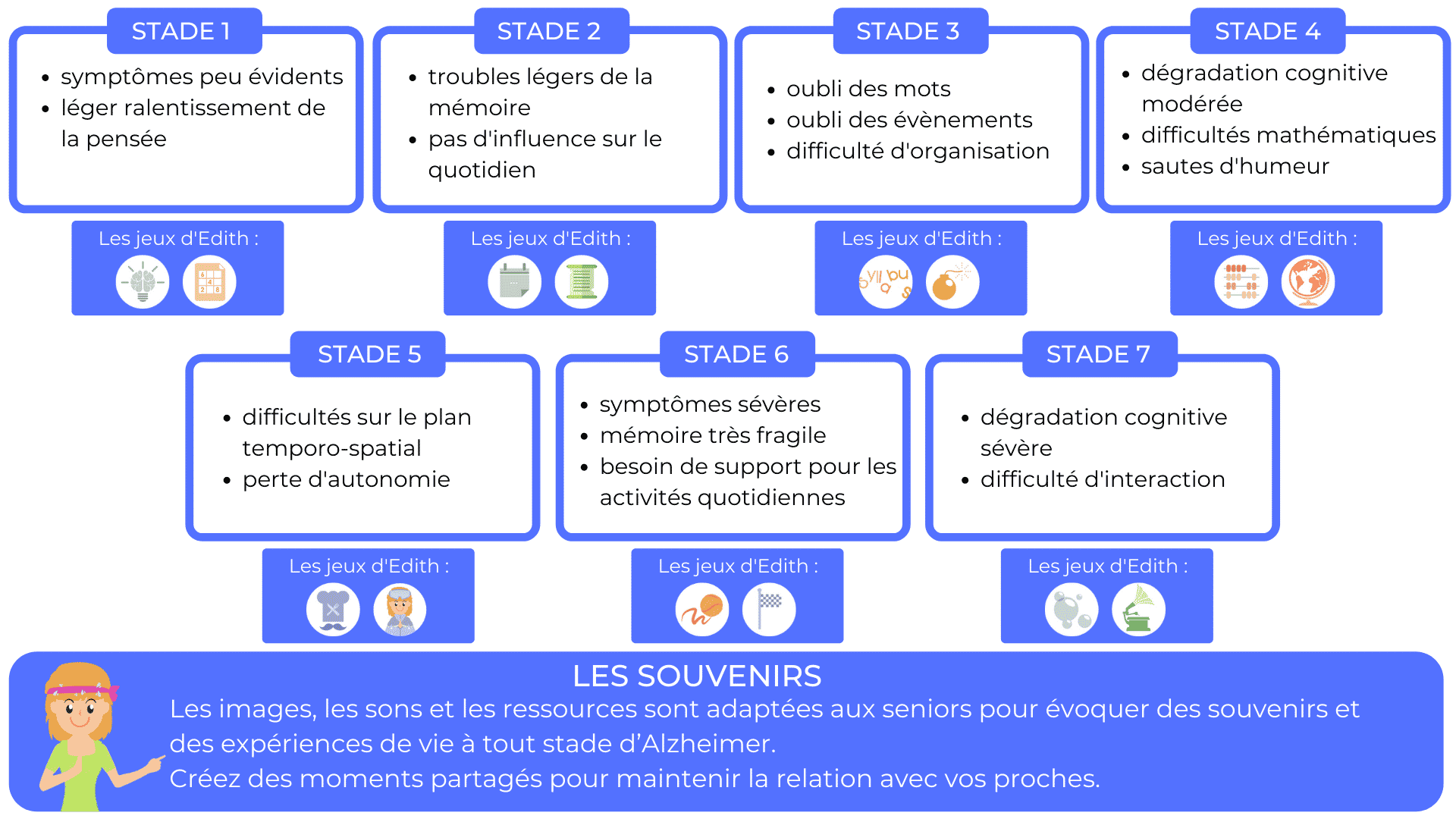The importance of understanding behavioral disorders in Alzheimer’s patients cannot be overstated. This understanding goes far beyond simply recognizing symptoms; it’s essential if we are to offer the best possible quality of life to those affected by this devastating disease. Behavioral disorders such as agitation, aggression, disorientation and anxiety are frequent manifestations of Alzheimer’s dementia, and can be extremely destabilizing for the patients themselves, as well as for their loved ones and the healthcare professionals around them. Understanding these behavioral disorders enables caregivers to better anticipate, manage and alleviate these symptoms, thus improving the patient’s overall quality of life. In addition, a thorough understanding of behavioral disorders promotes more effective communication with Alzheimer’s sufferers, strengthening emotional bonds and facilitating the provision of adapted care. It is therefore imperative to raise awareness of these disorders, promote research into non-medicinal management methods, such as the EDITH games and the Rolling Marble app, and to implement holistic care approaches to help these vulnerable individuals live their lives with dignity and comfort.
Behavioural problems in Alzheimer’s patients
Alzheimer’s disease is a devastating condition affecting millions of people worldwide. In addition to well-known cognitive symptoms such as memory loss and confusion, Alzheimer’s patients often experience behavioral disorders that can be extremely confusing and disruptive, both for themselves and for those around them. Understanding these behavioral disorders is essential to providing patients with appropriate support and improving their quality of life.
The benefits of the non-medication approach
The different types of behavioral disorders
Aggressiveness
Aggression is one of the most common behavioral disorders in Alzheimer’s patients. It often manifests itself in angry outbursts, shouting, violent gestures or general hostility towards others. Patients may react aggressively to the frustration caused by their inability to remember or communicate effectively.
Agitation
Agitation is another common behavior in people with Alzheimer’s disease. Patients may become restless, wander aimlessly, become impatient and have difficulty relaxing. This agitation may be caused by the confusion and anxiety that often accompany dementia.
Disorientation
Spatial and temporal disorientation is a major feature of Alzheimer’s disease. Patients can get lost even in familiar surroundings, fail to recognize family members or forget recent events. This disorientation can cause anxiety and contribute to behavioral problems.

Les causes des troubles du comportement chez les patients atteints d’Alzheimer
Comprendre les causes des troubles du comportement chez les patients atteints d’Alzheimer est essentiel pour une prise en charge efficace. Ces troubles peuvent être dus à divers facteurs, notamment :
Les changements cérébraux
La maladie d’Alzheimer provoque des modifications dans le cerveau, y compris la formation de plaques amyloïdes et de dégénérescence neuronale. Ces altérations peuvent affecter le contrôle émotionnel et le comportement.
La communication altérée
Les patients atteints d’Alzheimer éprouvent souvent des difficultés à communiquer leurs besoins et leurs émotions. L’incapacité à s’exprimer peut conduire à la frustration, à l’agitation et à l’agressivité.
Les facteurs environnementaux
L’environnement dans lequel évolue le patient peut également influencer son comportement. Un environnement bruyant, désorganisé ou stressant peut aggraver les troubles du comportement.
L’impact des troubles du comportement sur la qualité de vie du patient et de son entourage
Les troubles du comportement chez les patients atteints d’Alzheimer ont un impact significatif sur la qualité de vie, à la fois pour le patient lui-même et pour ses proches.
Pour le patient
Les troubles du comportement peuvent provoquer de la détresse émotionnelle et physique. Ils peuvent entraîner un isolement social, une perte d’estime de soi et une diminution de la qualité de vie globale du patient.
Pour l’entourage
Les proches et les soignants des patients atteints d’Alzheimer sont souvent confrontés à un stress considérable. Ils doivent faire face à des situations difficiles, telles que l’agressivité et l’agitation, ce qui peut avoir des répercussions sur leur propre bien-être mental et émotionnel.
Voici également un article intéressant sur les :“Conseils pour gérer les crises d’agressivité d’un patient atteint d’Alzheimer”.
L’approche non-médicamenteuse pour gérer les troubles du comportement
Les troubles du comportement chez les personnes atteintes de la maladie d’Alzheimer représentent un défi majeur pour les patients, leurs familles et les professionnels de la santé. Cependant, il existe une approche alternative, non-médicamenteuse, qui gagne en popularité en raison de ses nombreux avantages. Dans cet article, nous allons explorer pourquoi cette approche est de plus en plus reconnue comme une solution efficace pour la gestion des troubles du comportement. Nous aborderons également le rôle crucial des activités stimulantes dans ce contexte, tout en introduisant EDITH et La bille qui roule en tant que solutions non-médicamenteuses.
The benefits of the non-medication approach
The benefits of the non-medication approach
The non-medication approach offers many advantages for Alzheimer’s patients. Unlike drugs, which can sometimes have undesirable side effects, this approach focuses on non-pharmacological interventions. Notable advantages include:
- Greater safety: Non-medication procedures are generally safe, reducing the risks associated with taking medication.
- Improving quality of life: These approaches aim to improve the patient’s daily life by promoting emotional and physical well-being.
- Personalized care: As each patient is unique, the non-medication approach can be tailored to individual needs.
- Reduced side effects: Unlike drugs, non-medication interventions generally have no undesirable side effects.
- Maintaining autonomy: This approach enables patients to maintain their autonomy and actively participate in their own care.

The role of stimulating activities in managing behavioral disorders
The role of stimulating activities
Stimulating activities play a crucial role in managing behavioral problems in Alzheimer’s patients. These activities are designed to keep the brain active, stimulate memory and encourage social interaction. Beneficial stimulating activities include :
- Cognitive games: Games that challenge memory, thinking and problem-solving skills.
- Artistic activities: painting, drawing or music can be used to express emotions and stimulate creativity.
- Physical exercise: Regular physical activity is essential to maintain mobility and coordination.
- Discussion sessions: Encouraging conversation and social exchange can improve communication and reduce isolation.
Introducing EDITH and La bille qui roule to help Alzheimers with behavioural problems
As part of our ongoing commitment to improving the quality of life of Alzheimer’s patients, we are proud to present two innovative tools: EDITH and the La bille qui roule application. These solutions have been specially designed to meet the unique needs of patients while offering stimulating and engaging activities.
Game types available
- Memory games: These games help strengthen patients’ short- and long-term memory, enabling them to work on their ability to recall information and events.
- Thinking games: Thinking games stimulate logical thinking, problem-solving and decision-making, which can be particularly beneficial for Alzheimer’s patients.
- Social games: Social interaction is essential for emotional well-being. Our games encourage patients to communicate, interact and maintain social ties.

Benefits for Alzheimer’s patients
EDITH games offer a range of significant benefits for Alzheimer’s patients. By taking part in these activities on a regular basis, patients can :
- Stimulate their brain: Games help maintain brain activity, which can slow disease progression and improve cognitive function.
- Reducing agitation: Engaging in entertaining games can reduce agitation and anxiety, promoting a more stable emotional state.
- Promoting social interaction: Socialization games strengthen the bonds between patients and those around them, improving their overall quality of life.
Edith, adapted games


Accompanying a loved one with Alzheimer’s disease

My wife Christine was diagnosed with Alzheimer’s disease a few years ago, and since then our life has undergone many changes. Christine’s moments of confusion, agitation and anxiety became more and more frequent, and it was increasingly difficult for me to see her suffer in this way.
That’s when I discovered Dynseo’s Edith games program, designed specifically for people with Alzheimer’s disease and other cognitive disorders. At first, I was skeptical about how games could help Christine, but I wanted to try anything to bring her some comfort.
As soon as we started using Edith, I noticed an incredible change in Christine. The games were simple and interactive, which stimulated her in a positive way. She seemed to be having fun and relaxing while playing. The games were designed to exercise his memory, concentration and coordination, and it showed in his mood and behavior.
One of her favorite games was puzzles, where she could put pieces together to form beautiful pictures. It helped her concentrate, solve problems and feel proud of her achievements. Every play session was a moment of joy for both of us, and brought us closer together.
What particularly touched me was that the games seemed to soothe Christine. She became less agitated and anxious, and our relationship improved. Moments of confusion were less frequent, and we could enjoy moments of calm together.
Edith has become an important part of our daily routine. Not only has it had a positive impact on my wife’s life, but it has also given me a way to support her and create moments of happiness in our daily lives.
I’d like to thank Dynseo for developing such a wonderful program. Edith has brought comfort to our life with Alzheimer’s, and I highly recommend her to other families going through this ordeal. It can make a real difference to you and your loved ones.
Introducing the La bille qui roule application
The Rolling Marble is an application specially designed to improve concentration and fine motor skills in Alzheimer’s patients. This application offers a variety of interactive activities that stimulate users’ physical and mental capacities.
How it helps improve concentration and fine motor skills
- Coordination games: La bille qui roule offers games that require precise hand coordination, encouraging the development of fine motor skills.
- Concentration activities: Concentration games help patients stay attentive and improve their ability to focus on specific tasks.
- Interactive rewards: The virtual rewards offered by the application encourage patients to persevere in their efforts and stay engaged in the activities.

LINE FOLLOW-UP
You can choose from several routes to follow with the ball.

CENTER BALL
The aim of the game is to keep the ball in the center of the screen for an allotted time.

CIRCLE TRACKING
You have to keep the ball inside the moving circle.

PASSAGE OF CIRCLES
The aim is to pass the ball through the circles that appear on the screen.

WIND RESISTANCE
The aim is to stay in the middle zone as long as possible.

REMONTCURRENT
The aim is to reach the goal as quickly as possible while avoiding obstacles.
One of Christine’s favorite features was the “Rolling Marble” tablet exercises. These exercises were fun and engaging, and she seemed to really enjoy doing them. They involved virtually rolling a marble through courses and achieving various objectives, requiring fine concentration and coordination.
What impressed me was that these exercises enabled Christine to concentrate on a task for longer than usual. She was so absorbed in the game that she sometimes forgot her worries and confusion. It was incredible to see her so committed and focused.
On top of that, playing “The Rolling Marble” on the tablet with Christine was a precious moment of sharing for both of us. It allowed us to create memories together, laugh and enjoy our time together as a family. These moments of happiness were precious and strengthened our connection.
Over time, I noticed that Christine seemed more alert and fulfilled thanks to these exercises. She also seemed less anxious and agitated. It was a breath of fresh air for both of us, and improved our daily quality of life.
I’m deeply grateful to Dynseo for developing programs like Edith and “La bille qui roule”. They brought pleasure and stimulation to Christine’s life, and helped us to live better with Alzheimer’s disease. I highly recommend these resources to any family facing similar challenges.
Les associations qui peuvent vous aider
Voici la liste de quelques associations qui pourront également vous aider :
- France Alzheimer et maladies apparentées
Site Web : https://www.francealzheimer.org/ - L’Association pour la Recherche sur Alzheimer (ARA)
Site Web : https://www.ara-geai.org/ - Fondation Vaincre Alzheimer
Site Web : https://www.fondation-vaincre-alzheimer.org/ - France Parkinson (qui s’occupe également de la maladie de Parkinson, mais peut fournir des informations sur les troubles cognitifs)
Site Web : https://www.franceparkinson.fr/ - France Alzheimer Yvelines (une section locale de France Alzheimer)
Site Web : https://www.francealzheimer78.org/ - Association France Alzheimer Landes (une section locale de France Alzheimer)
Site Web : http://www.francealzheimer-landes.org/ - La Fondation Alzheimer
Site Web : https://www.fondation-alzheimer.org/ - Ligue Alzheimer (Ligue Européenne Contre la Maladie d’Alzheimer)
Site Web : https://alzheimer-europe.org/ - France AVC (Association de lutte contre les accidents vasculaires cérébraux, qui peut également fournir des informations sur les troubles cognitifs)
Site Web : https://www.franceavc.com/ - Solidarité Alzheimer
Site Web : https://www.solidarite-alzheimer.org/
Other articles that might interest you:
No Results Found
The page you requested could not be found. Try refining your search, or use the navigation above to locate the post.




